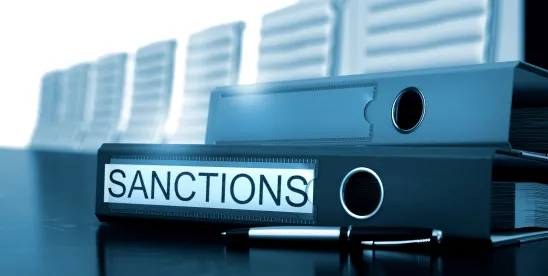On 15 May 2025, the UK government published a policy paper summarising findings from a cross-government review of sanctions implementation and enforcement. The Foreign, Commonwealth and Development Office led the review in collaboration with insights from external sanctions experts, as well as key sanctions departments and agencies, including HM Treasury, the Department for Business and Trade, the Department for Transport, HM Revenue and Customs (HMRC) and the National Crime Agency.
Anyone involved in advising on or implementing sanctions programs should take note of the content of these findings, as they illustrate where the United Kingdom’s sanctions implementation agencies will be focusing over the next few years.
The aim of the review was to identify further steps to improve and facilitate compliance, increase the deterrent effect of enforcement and invigorate the cross-government toolkit. The UK government has committed to implementing the review conclusions summarised below in the financial year 2025–2026:
Compliance
Targeted Guidance and Enhanced Outreach
The UK government will create additional guidance for, and increase engagement with, sectors with lower levels of sanctions awareness.
Engagement sessions conducted during the review highlighted variable levels of sanctions awareness within different sectors, with smaller businesses less able to access specialist advice.
Clearer and More Accessible Guidance
Sanctions guidance will be better organised, modern and searchable, with read across clearly signposted by posting comprehensive updates to sanctions pages and statutory guidance on GOV.UK.
Single Sanctions List
A single sanctions list incorporating the UK Sanctions List and the Consolidated List of Financial Sanctions Targets will be created. The list will aid industry in screening for designated persons, especially those targeted with non-financial designations, ensuring vital notifications do not go missed.
Ownership and Control
Guidance will be created to further clarify ownership and control obligations. Industry input highlighted the complexities of ownership and control determinations, involving complex due diligence and significant legal costs. Alignment with international partners on ownership will also be an area the UK government will focus on building.
Deterrence
Publication of Enforcement Information
It is vital that the consequences of sanction breaches are clear for effective deterrence. Sanctions enforcement actions will be published regularly for “teachable moments.”
Sanctions Enforcement Strategy
A government-wide sanctions enforcement strategy will be published to detail the range of enforcement outcomes available for non-compliance.
Penalty Settlement System
Currently, the United Kingdom does not have powers to agree to early settlements for sanctions cases beyond HMRC’s compound penalties. The UK government has committed to developing an early civil settlement scheme for breaches of financial sanctions.
Fast-Track Penalties
An accelerated civil penalty process for certain financial sanctions breaches will be developed to allow more resources and time to be given to the most complex, serious and deliberate of breaches.
Toolkit
Making It Easier to Report Suspected Breaches
Moving forward, reporting requirements will become clearer, with the potential for a single reporting point for suspected breaches. The aim is to avoid confusing reporting and potentially misdirected information.
Whistle-Blower Protections
Currently, to qualify for whistle-blower protection, a worker would need to make a disclosure to an employer, a legal advisor or a “prescribed person” under the Public Interest Disclosure (Prescribed Persons) Order 2014 (the Order). The UK government is committed to updating the Order to prescribe relevant government departments in relation to financial, transport and certain trade sanctions.
Future Commitments
The UK government has committed to exploring other areas to go further and deeper to improve sanctions enforcement and implementation depending on resourcing and emerging priorities.
Conclusion
These efforts aim to ensure the United Kingdom’s sanctions are robust, clear and effectively support foreign policy and national security goals.






 />i
/>i

